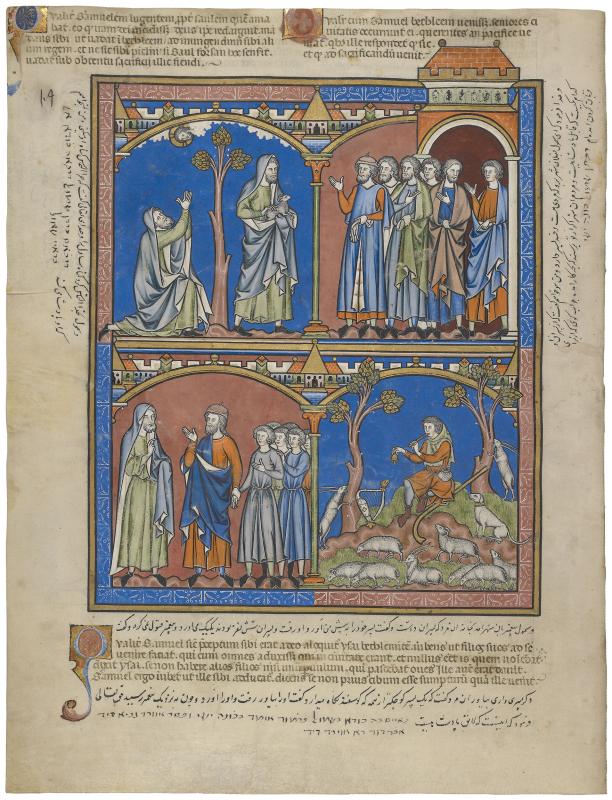
Samuel's Grief, Samuel Arrives in Bethlehem, David, a New Hope
Old Testament Miniatures with Latin, Persian, and Judeo-Persian inscriptions
Purchased by J.P. Morgan (1867–1943) in 1916
Folio 25v (Latin)
Upper left: How God himself reproved Samuel, when he mourned for Saul, whom he loved, because the latter had fallen in with God’s anger, ordering him to go to Bethlehem to anoint another king for him, and in order that he might not be in danger if Saul sensed that, he told him to go as if for sacrificial purposes. (I Samuel 15:35 – 16:2)
Upper right: How, when Samuel had reached Bethlehem, the elders of the city rushed to meet him asking if he comes in peace, to whom he responds that he does, and that he comes to offer a sacrifice. (I Samuel 16: 4–5)
Lower half: How Samuel talks to Jesse the Bethlehemite, as God had ordered, telling him to bring his sons to him. When he had fetched all those who were in the city and none of them was the one he wanted, Jesse said that he had no more sons except a young one who was tending the sheep. This indeed was David. Therefore Samuel ordered that he be brought to him, saying that he will not eat before David’s arrival. (I Samuel 16: 6, 11)
Folio 25v (Persian)
Persian foliation 19
Upper left margin: Samuel pleaded with God on account of Saul’s sin and God the Exalted said, "Why do you plead on account of his sin? I do not want him to rule."
Upper right margin: God said, "O, Samuel, go to that city where there is a man who has several sons and I shall tell you which of his sons deserves kingship. If the people of that city ask you about the purpose of your coming, reply that you have come to offer sacrifices."
Lower half, above and below Latin inscription: The prophet Samuel came to the house of the man who had sons in that city and he said, "Bring your son to me." And he went and brought the sons one by one, numbering to six, and the prophet did not accept [them] and said, "Have you another son? Bring him." The man said, "I have one son younger than all who herds the sheep." And when he came near the prophet, God the Exalted said, "This is the one worthy of kingship."
Folio 25v (Judeo-Persian)
Upper left margin, furthest left: Samuel supplicates at God’s threshold for the sake of Saul.
Upper right margin, furthest right, follows Persian: Samuel goes to Jesse’s house.
Lower half, beneath Persian: It is here that God, having commanded Samuel, he came to the house of Jesse and at last saw David.
Samuel's Grief
Although angry with Saul for his disobedient behavior, Samuel mourns for the king. As the priest grieves, the Lord reproaches him for doubting His judgment. Following the Lord's order, Samuel arises, collects a lamb, and departs for Bethlehem. There, the Lord has chosen a new king from among the sons of Jesse. (1 Kings 15:35–16:2)
Samuel Arrives in Bethlehem
Elders of Bethlehem greet Samuel at the city gate. The priest assures them that his intentions are peaceful. (1 Kings 16:3–5)
David, a New Hope
After offering a sacrifice to the Lord, Samuel sanctifies Jesse and his sons. The priest asks the Lord to identify the chosen one, but he is not among the sons. "Are all the young men here?" Samuel asks. "There remains yet the youngest," replies Jesse, "and there he is, keeping the sheep." On a nearby hillock, David sits playing his pipe and ringing a bell. A dog, seven sheep, and three goats surround him. His favorite instrument, the harp, leans against a tree. (1 Kings 16:5–11)
